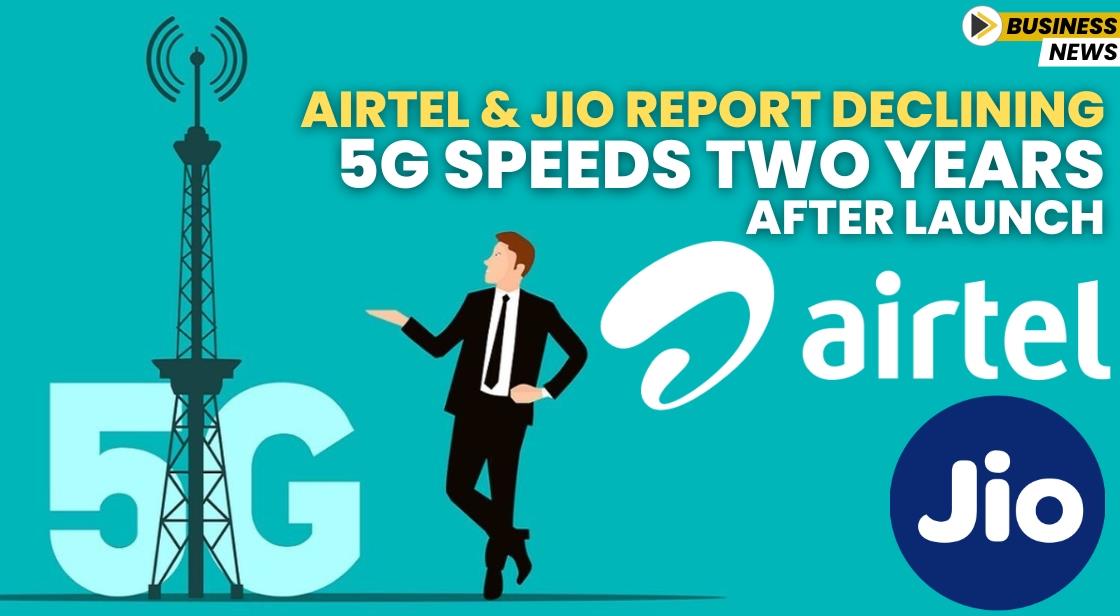Airtel and Jio Report Declining 5G Speeds Two Years After Launch

News Synopsis
India has emerged as a significant player in the 5G landscape, boasting one of the highest levels of 5G availability in the region. This achievement can largely be attributed to the concerted efforts of major telecom providers, Jio and Airtel. However, recent data from Opensignal, an analytics firm, raises concerns about the current state of 5G performance in India. The report reveals a troubling trend: average 5G download speeds for both providers have experienced a significant decline since the network's initial launch two years ago.
Reasons Behind the Decline in 5G Speeds
The decline in 5G speeds can primarily be traced back to increased congestion resulting from the rapid adoption of 5G technology and a surge in data consumption among users. As more individuals and businesses shift to 5G networks, the demand for bandwidth has skyrocketed, leading to congested networks that struggle to maintain high-speed performance.
Key Performance Metrics of Airtel and Jio
The Opensignal report highlights critical performance metrics that shed light on the 5G experience for users of Airtel and Jio. One of the key factors influencing the user experience is spectrum management and usage. Currently, only 16 percent of 5G users are utilizing the 700MHz frequency band, which, while providing broader coverage, typically delivers slower speeds. In stark contrast, 84 percent of users rely on the 3.5GHz band, which offers faster speeds but is limited in coverage area.
As the demand for data continues to surge, service providers are grappling with the challenge of managing their spectrum resources effectively. This mismanagement can lead to further declines in network performance, frustrating users who expect seamless connectivity.
Performance Comparison: Airtel vs. Jio
In terms of performance metrics, Airtel has reported an average 5G download speed of approximately 240 Mbps, making it 6.6 percent faster than its competitor, Reliance Jio. Furthermore, Airtel boasts a higher 5G upload speed at 23 Mbps, outperforming Jio by an impressive 83 percent. The data used for this analysis was collected over a 90-day period from June 1 to August 29, focusing on major players in the market: Airtel, Reliance Jio, Vodafone Idea, and government-owned BSNL.
It's important to note that Vi (Vodafone Idea) and BSNL have not yet rolled out commercial 5G services, which means Airtel and Jio remain the leading forces in India's 5G landscape.
Strategies for Managing Traffic Demands
To address the increasing demands on their networks, both Airtel and Jio have developed strategies aimed at enhancing traffic management and improving user experience. Airtel is focusing on reallocating its mid-band spectrum and has plans to deploy 5G Standalone (SA) technology. This shift aims to reduce reliance on 4G networks, potentially alleviating some of the congestion issues currently affecting users.
On the other hand, Jio is also making significant strides in optimizing its network. The company is enhancing its SA 5G network and refining its spectrum usage strategies to better manage traffic and improve overall performance. These efforts are essential as both companies navigate the complexities of delivering high-speed connectivity in an increasingly crowded digital landscape.
Awards and Recognitions
Despite the current challenges in network performance, both Airtel and Jio have received recognition for their 5G services. Airtel has been lauded for its outstanding 5G services, earning multiple awards for video and gaming experiences, showcasing its commitment to delivering quality entertainment and connectivity to its users.
Conversely, Jio has been honored with the Consistent Quality award, which highlights its strong performance in providing reliable services for demanding applications. Additionally, Jio has excelled in 5G availability and coverage, securing three awards in this category. Meanwhile, Airtel holds the title for the fastest download and upload speeds in India, further emphasizing the competitive landscape between these two telecom giants.
Conclusion: The Road Ahead for 5G in India
As Airtel and Jio grapple with declining 5G speeds amid rising demand, their ability to innovate and optimize their networks will be critical in shaping the future of 5G in India. Both companies are committed to improving their services and enhancing user experiences, but it remains to be seen how effectively they can navigate the challenges posed by increased congestion and data consumption.
With the right strategies in place, there is potential for both providers to reclaim their positions as leaders in the 5G space, ultimately benefiting millions of users across the country. As the competition intensifies, users will be watching closely to see how Airtel and Jio respond to the evolving landscape of telecommunications in India.
You May Like









